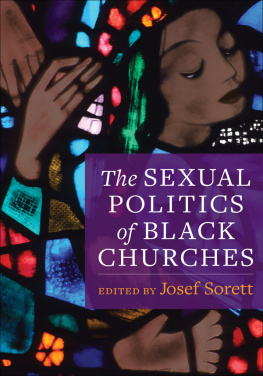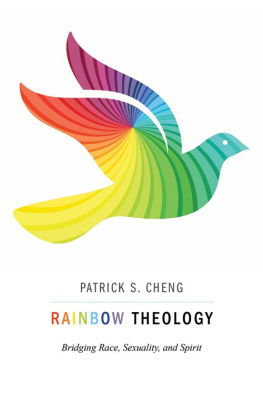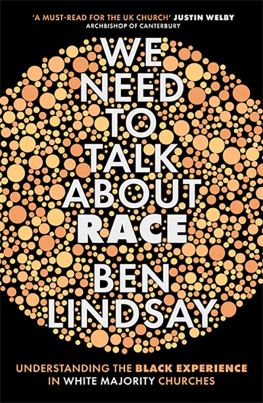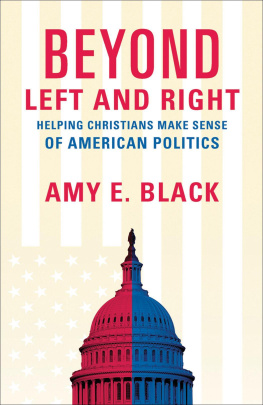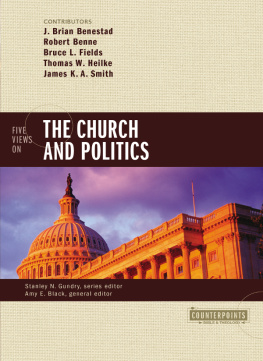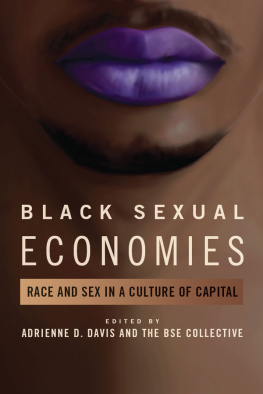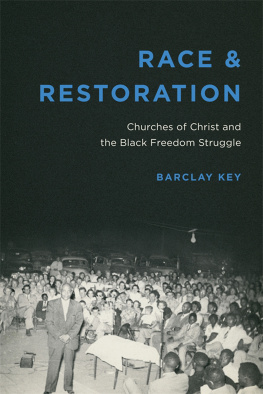Table of Contents
Josef Sorett and a team of scholars, practitioners, artists, and thinkersblended at the intersections of their expertisepresent readers with an invitation to explore and feel our way through important discussions of Blackness, sexuality, and church/spiritual politics. Written and presented as a communal practice of listening, learning, and reasoning together, this book illuminates what matters today in Black religious discourse.
Thelathia Nikki Young, author of Black Queer Ethics,
Family, and Philosophical Imagination
I am a Same-Gender-Loving African American Woman, Pastor, Bishop, Teacher, Preacher, Mother, and evolving Pentecostal Justice Warrior! I find my whole self and my community deeply situated in The Sexual Politics of Black Churches, a collection of experiences and studies focused on the Black Church and Sexuality. It was a joy to be part of the conversations, and the finished product is filled with scholarship and liberation power!
Rev. Dr. Yvette A. Flunder, presiding bishop of the
Fellowship of Affirming Ministries
The Sexual Politics of Black Churches is not only timelyeven overduebut especially rewarding intellectually, politically, and ethically. Advancing conversations on sexuality and Black Christianity, this work is essential reading for anyone interested in Black Christianity in general, in religion and sexuality, in studies of religion and race, and in accounts of theology and politics in the United States. A wonderful achievement.
Anthony Petro, author of After the Wrath of God:
AIDS, Sexuality, and American Religion
The Sexual Politics of Black Churches
Religion, Culture, and Public Life
Series Editor: Matthew Engelke
The Religion, Culture, and Public Life series is devoted to the study of religion in relation to social, cultural, and political dynamics, both contemporary and historical. It features work by scholars from a variety of disciplinary and methodological perspectives, including religious studies, anthropology, history, philosophy, political science, and sociology. The series is committed to deepening our critical understandings of the empirical and conceptual dimensions of religious thought and practice, as well as such related topics as secularism, pluralism, and political theology. The Religion, Culture, and Public Life series is sponsored by Columbia Universitys Institute for Religion, Culture, and Public Life.
For a complete list of titles, see page 263.
The Sexual Politics
of Black Churches
Edited by
Josef Sorett
Columbia University Press
New York
Publication of this book was made possible in part
by funding from the Institute for Religion, Culture,
and Public Life at Columbia University.
Columbia University Press
Publishers Since 1893
New York Chichester, West Sussex
cup.columbia.edu
Copyright 2022 Columbia University Press
All rights reserved
EISBN 978-0-231-54777-2
Library of Congress Cataloging-in-Publication Data
Names: Sorett, Josef, editor.
Title: The sexual politics of Black churches / Josef Sorett, editor.
Description: New York : Columbia University Press, [2021] | Includes index.
Identifiers: LCCN 2021030088 (print) | LCCN 2021030089 (ebook) |
ISBN 9780231188326 (hardback) | ISBN 9780231188333 (trade paperback) |
ISBN 9780231547772 (ebook)
Subjects: LCSH: African American churchesDoctrines. | SexReligious aspectsChristianity. | African American churchesPolitical activity.
Classification: LCC BR563.N4 S485 2021 (print) | LCC BR563.N4 (ebook) | DDC 264.008996073dc23
LC record available at https://lccn.loc.gov/2021030088
LC ebook record available at https://lccn.loc.gov/2021030089
A Columbia University Press E-book.
CUP would be pleased to hear about your reading experience with this e-book at .
Cover design: Milenda Nan Ok Lee
Cover image: Hisham Ibrahim / PhotoV / Alamy
This book is dedicated in memory of Janisha Renee Gabriel
Colleague, Friend, Believer in the fullness of Black Lives
(October 15, 1980 ~ September 6, 2020)
Contents
Josef Sorett
Josef Sorett
1. Religion, Race, and Sexuality in American Culture:
A Public Conversation
featuring Victor Anderson, Serene Jones, and Barbara Savage;
moderated by Cathy Cohen and Josef Sorett
Nyasha Junior
3. An Inconsistent Truth: The New Testament,
Early Christianity, and Sexuality
Michael Joseph Brown
PART III Historical and Cultural Formations of Black
(Christian) Sexual Politics
4. Have the Sons of Africa No Souls? Manliness, Freedom, and Power in
the Cultural Roots of Afro-Phallic Protestantism
Jonathan Lee Walton
5. Everybody Knew He Was That Way: Chicagos Clarence H. Cobbs,
American Religion, and Sexuality During the PostWorld War II Period
Wallace Best
6. Interrogating the Passionate and the Pious: Televangelism
and Black Womens Sexuality
Monique Moultrie
7. The Self-Interested Politics of Collective Religious Transformation:
Issues of Family Definition and LGBT Inclusion in Black Churches
Melynda J. Price
8. Intersectional Invisibility and the Experience of Ontological Exclusion:
The Case of Black Gay Christians
Valerie Purdie Greenaway, Richard Eibach, and Nick Camp
Monica A. Coleman
10. Flesh That Needs to be Loved:
Wounded Black Bodies and Preachin in the Spirit
Luke A. Powery
11. Aiding and Abetting New Life:
Sex-Talk in the Pulpit, Pew, and Public Square
Brad R. Braxton
12. An Experiment in Inclusion:
A Conversation with Christine and Dennis Wiley
Interview by Derrick McQueen
Josef Sorett
Josef Sorett
I t is customary to reiterate, in acknowledgments, the truth that no book reaches print solely by the efforts of a single author. All books are the productions of multiple people, connected by various webs of relationships. This fact is all the more true for an anthology such as this one, which consists of twelve chapters and eighteen contributors. Moreover, as acknowledged in both the volumes introduction and epilogue, this book began and took shape in the context of an event that evolved into a set of conversations that eventually took the form of a center at Columbia Universitythe Center on African-American Religion, Sexual Politics and Social Justice (CARSS). This anthology, like CARSS, is a community affair that includes a range of individuals who have done everything from attend a single event, serve on a panel, present a paper, and write or comment on a chapter, to those who have offered sustained support and guidance to all of CARSSs work, including the work that preceded the center, over the past decade. To be clear, this volume stands on its own, but it took shape in the context of a set of conversations that led to the founding of CARSS. Without the community of people that have participated in and supported CARSSs work in various forms, this book never would have seen the light of day. Accordingly, these acknowledgments necessarily express appreciation both to CARSSs extended community, and to those who helped move this book project forward in more specific ways.

